 I belong to a local writers’ circle and yesterday it was my turn to lead the session. We have a lively discussion which resulted in more ideas. Here’s a potted version… I belong to a local writers’ circle and yesterday it was my turn to lead the session. We have a lively discussion which resulted in more ideas. Here’s a potted version…
1. Know what you really want
Not what other people, e.g. family, spouses and friends think you want, nor what you think you should want.
Is writing a ‘want’, a ‘need’ or an ‘obsession’ (possibly an addiction)?
Deal with guilt that writing isn’t a good use of time or a valid job – it’s not selfish, it’s what you want to do.
2. Write now and enjoy it
Write and enjoy it, whatever your goals, whatever kind of writing you do.
Don’t over anticipate the future, e. g. ‘when I get discovered’, ‘when my book becomes a bestseller’.
But don’t let what you’ve done in the past set your writing agenda or stifle your work.
Have a plan, but don’t get obsessed by it – everything will change.
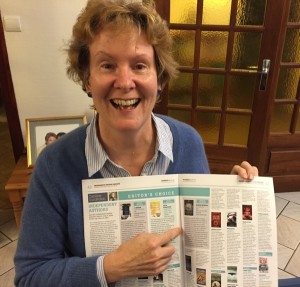 3. Be proud of what you have achieved 3. Be proud of what you have achieved
It can be by participating in a group, finishing a scene, being placed in a competition, publishing your work, getting a five star review or just making somebody laugh at your comedy writing or be moved by your poem.
And don’t compare your own achievements with other people’s; every writer is different.
4. Create and seize opportunities
You are not entitled to recognition however brilliant your writing.
It’s very rare to get a ‘break’ or ‘be discovered’ – usually only in novels or a films (Sorry!)
The old adage is true, ‘The harder I work, the luckier I get.’
Use every life event /change and every meeting with other people, especially fellow writers, as an opportunity.
And when opportunity is in front of you, take it.
5. Share with others
You won’t feel isolated, shut in your bat-cave, desperate to talk about your writing with somebody who understands.
Giving back knowledge and experience is more pleasurable than you think.
You might spark the next Booker prize winner on their way by giving them one little helpful hint.
Others will be open about sharing with you, to your great benefit.
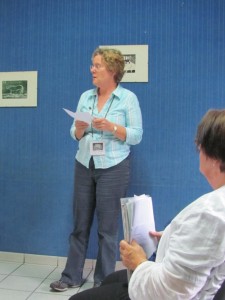 6. Take risks 6. Take risks
Dare to read your piece aloud, enter that competition, send your manuscript out to agent and publishers, or for assessments and competitions.
Put your opinion forward, volunteer to lead a session.
Try something you think you can’t do – you may surprise yourself.
If you have a deadline, feel overwhelmed or absorbed with a writing project, take the risk of saying no and displeasing others.
Creation is always risky; you never know what you may discover in yourself, both good and bad, but it may be something glorious.
Humans are naturally risk-averse – thank the Stone Age for that – but do it anyway.
7. Work hard and be persistent
Swanning around being creative is 5% of the job.
Sit down every day and write a minimum number of words even if you revise them all another day.
Organise your work, research methodically and turn off the Internet while you are inputting your words on the keyboard.
Don’t leave the hard slog of writing until a month before the deadline; start now.
Anything else to add to that list?
Alison Morton is the author of Roma Nova thrillers, INCEPTIO, PERFIDITAS, SUCCESSIO and AURELIA. The fifth in the series, INSURRECTIO, was published on 12 April 2016.
Find out more about Roma Nova, its origins, stories and heroines…
If you enjoyed this post, do share it with your friends!Like this:Like Loading...
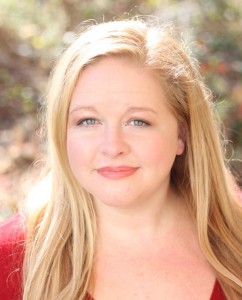 Today, I’m delighted to welcome historical novelist Kate Quinn. A native of southern California, Kate graduated from Boston University with bachelor’s and master’s degrees in Classical Voice. A lifelong history buff, she has written four novels in the Empress of Rome Saga and two set in the Italian Renaissance about the early years of the infamous Borgia clan. Readers may also remember Kate as one of the authors of A Day of Fire – see the interview with Ben Kane. Today, I’m delighted to welcome historical novelist Kate Quinn. A native of southern California, Kate graduated from Boston University with bachelor’s and master’s degrees in Classical Voice. A lifelong history buff, she has written four novels in the Empress of Rome Saga and two set in the Italian Renaissance about the early years of the infamous Borgia clan. Readers may also remember Kate as one of the authors of A Day of Fire – see the interview with Ben Kane.
Kate has succumbed to the blogging bug, and keeps a blog filled with trivia, pet peeves, and interesting facts about historical fiction. She and her husband live in Maryland with a small black dog named Caesar, and her interests include opera, action movies, cooking, and the Boston Red Sox.
Lovely to see you here, Kate. I really enjoyed Lady of the Eternal City about Vibia Sabina, Hadrian’s wife – thank you for the advance copy.
You’re welcome!
Hadrian is known to many people for Hadrian’s Wall in northern Britain, but he was a good governor, administrative reformer, proven military commander and patron of arts and architecture. But despite his love of Greece and Greek culture, he was very much a Roman of his time in his actions, i.e. prone to brutality and autocratic behaviour.
Roman women are often left out of the historical records; when they are included on occasion as Livia was, it’s exceptional. How do you approach ‘re-making’ the character of Sabina, when there is so little recorded about her?
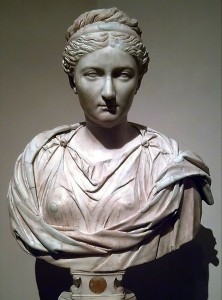 Vibia Sabina (Prado Museum, Madrid) Empress Sabina is a cipher—we have very few surviving concrete facts about her life, which I love. If it isn’t known, I’m free to make it up! What found the most interesting about her was her relationship with her mercurial husband, and with his beautiful male lover Antinous. There is historical evidence that Sabina and Hadrian disliked each other—but why did he still take her with him on his travels, and why did he never divorce her? And when he fell in love with Antinous, Sabina as the humiliated wife had good cause to feel shamed or angry, but she apparently gave the whole situation her seal of approval. Definitely some interesting marital dynamics there!
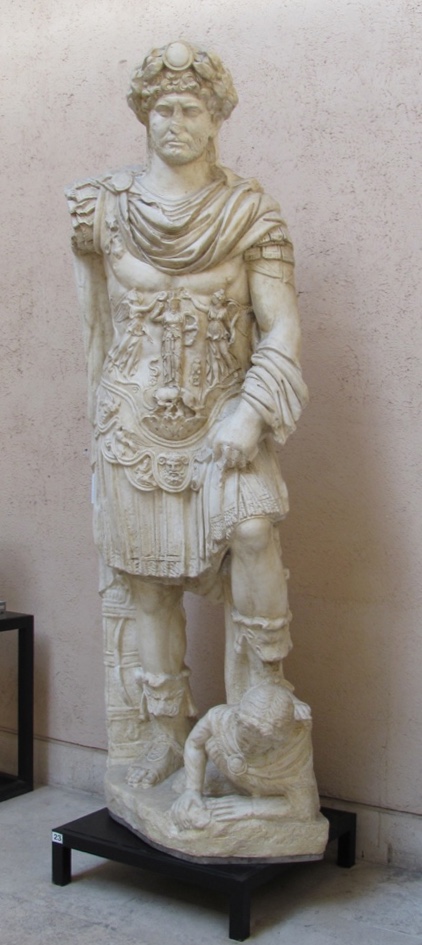
What was the most interesting, or shocking thing you discovered when researching this story?
Hadrian’s personality was the most fascinating—and frustrating—thing I have ever found in my research. He’s an extremely mercurial, contradictory character; almost every personality trait he exhibits is bracketed by its exact opposite. He was a spiritual cynic; a superstitious man of science; a lazy workaholic; a humble bragger; a blood-thirsty animal lover. He was extremely hard to pin down as a character, and I still have no idea if my version is anywhere near the truth.
(I find this statue in the Museum of Roman Civilisation – made after one of Hadrian’s conquests – with its martial pose, yet the un-Roman moustache and curling hair a perfect physical example of this contradiction.)
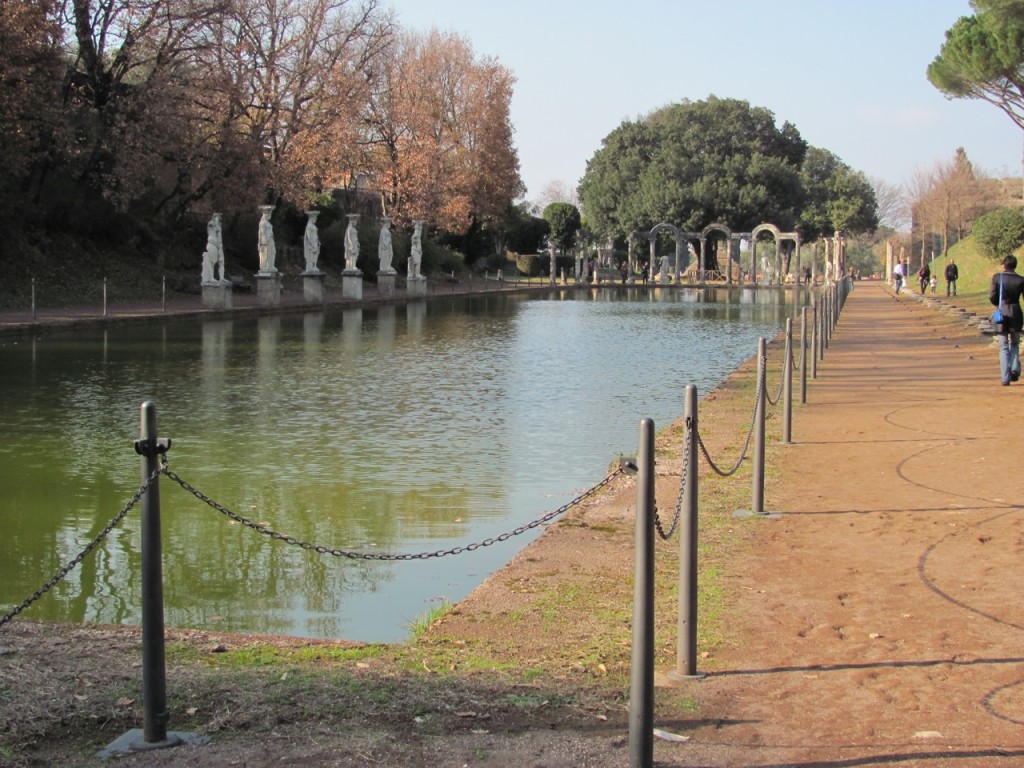 Hadrian’s villa at Tivoli outside Rome How do you feel about using setting and backstory in your work, especially for readers unfamiliar with Roman history?
There was both a lot of setting and a lot of backstory in this book. For one, Hadrian was an inveterate traveler and I had 10+ provinces to describe and make distinct. For the other, this book is a sequel to Empress of the Seven Hills where Hadrian, his future wife, and his future bodyguard first begin their dance of fascination, love, hatred, and secrets. 10 provinces and 20 years of complicated backstory is probably the reason this book is the longest I’ve written to date—but I loved playing with both, because I think it made the world inside the book richer. Ancient Rome sometimes gets boiled down to marble columns, gladiatorial games, and roast dormice at banquets—but showing readers how wide the range of experience was through the provinces and how the various social strata interacted with historical events makes for a more complete picture of a past era.
Do you think fiction does anything to help us understand the past, or is it purely entertainment?
Good historical fiction helps get rid of the veil over the past—the veil that keeps us from realizing that people of bygone eras were much like us. Even if the trappings of their lives are strange to modern eyes, people of ancient Rome or Renaissance France or WWI Britain still ate, drank, loved, laughed, hated, danced, and had all the same human feelings we do today—and good HF is just about the best way to make that real.
So what’s the new book Lady of the Eternal City about?
The fourth volume in the Empress of Rome series, published 3 March 2015, a new tale of the politics, power, and passion that defined ancient Rome.
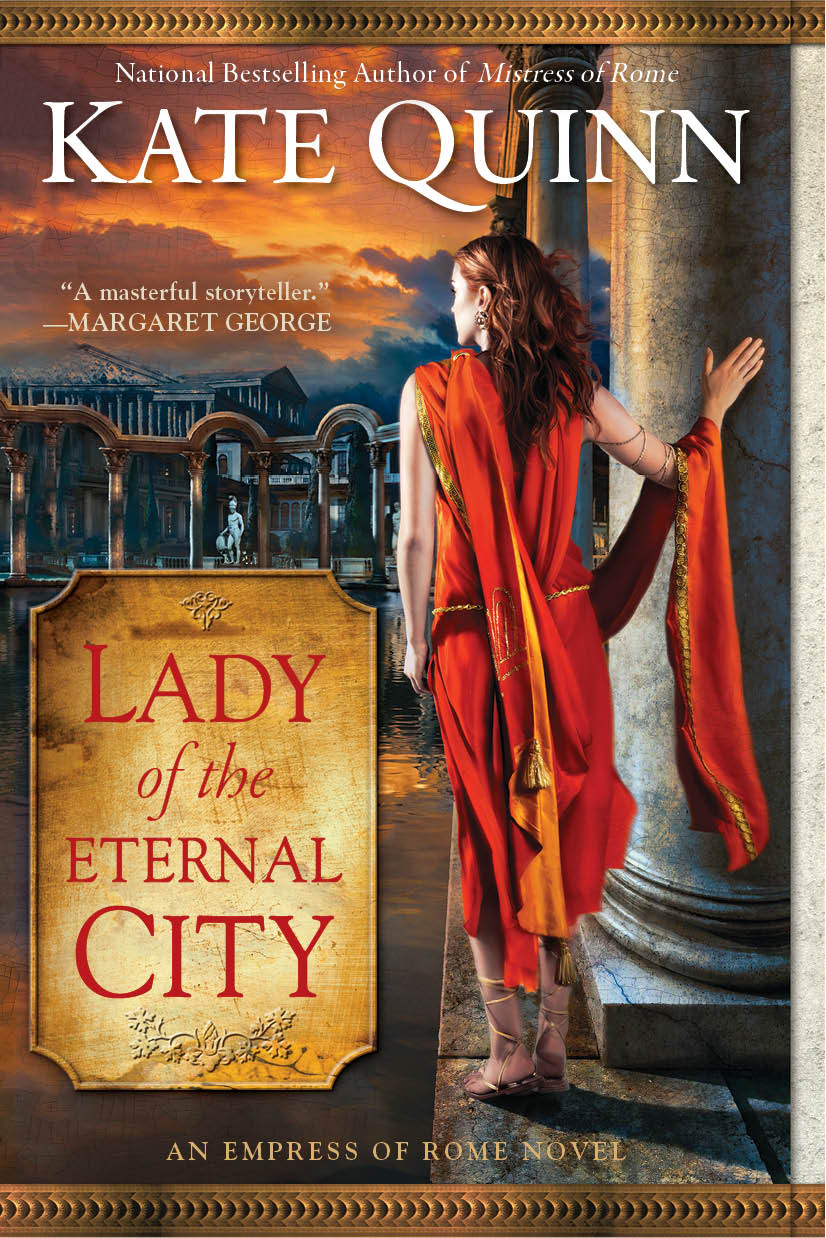 Elegant, secretive Sabina may be Empress of Rome, but she still stands poised on a knife’s edge. She must keep the peace between two deadly enemies: her husband Hadrian, Rome’s brilliant and sinister Emperor; and battered warrior Vix, who is her first love. But Sabina is guardian of a deadly secret: Vix’s beautiful son Antinous has become the Emperor’s latest obsession. Elegant, secretive Sabina may be Empress of Rome, but she still stands poised on a knife’s edge. She must keep the peace between two deadly enemies: her husband Hadrian, Rome’s brilliant and sinister Emperor; and battered warrior Vix, who is her first love. But Sabina is guardian of a deadly secret: Vix’s beautiful son Antinous has become the Emperor’s latest obsession.
Empress and Emperor, father and son will spin in a deadly dance of passion, betrayal, conspiracy, and war. As tragedy sends Hadrian spiraling into madness, Vix and Sabina form a last desperate pact to save the Empire. But ultimately, the fate of Rome lies with an untried girl, a spirited redhead who may just be the next Lady of the Eternal City . . .
Available in the UK at Amazon UK iTunes Nook Kobo
And my thoughts!
I knew about Hadrian, Sabina and Antinous from history, but the clever weaving of their stories with that of the fictional tough ‘barbarian’ Vix and the younger Faustina and Marcus as children enchants you. I have wandered through the remains of Hadrian’s Tivoli villa near Rome and, of course, embrace Hadrian’s Wall as part of my national heritage, but Kate Quinn breathes life into these places so you are gazing at the star sky at the northern edge of the world and feel the heartbreak of duty and love tearing you apart on the River Nile, in Judea, in Rome. The author uses different points of view with care, giving readers insight in to the minds and emotions of each character without burdening them with unnecessary detail nor losing them. Highly recommended.
More about Kate:
Website and blog Facebook Goodreads Twitter
Alison Morton is the author of Roma Nova thrillers, INCEPTIO, PERFIDITAS and SUCCESSIO. The fourth book, AURELIA, is due out in May 2015.
Find out more about Roma Nova, its origins, stories and heroines…
If you enjoyed this post, do share it with your friends!Like this:Like Loading...
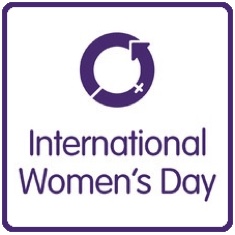 Yesterday was International Women’s Day – on balance, a good thing to remind us of women’s concerns, status and aspirations. And there were celebrations, affirmation and renewed determination – all good stuff. But it’s a bit like your birthday – all cake, champagne, greetings, celebrations – but today it’s about washing up, wiping up the spills, putting the bottles in the recycling bin and cleaning the loo. Yesterday was International Women’s Day – on balance, a good thing to remind us of women’s concerns, status and aspirations. And there were celebrations, affirmation and renewed determination – all good stuff. But it’s a bit like your birthday – all cake, champagne, greetings, celebrations – but today it’s about washing up, wiping up the spills, putting the bottles in the recycling bin and cleaning the loo.
#makeithappen was the hashtag for the day which was started thirty six years ago when the UN General Assembly invited member states to mark March 8 as a day to celebrate women and world peace. Impressive advances have been made with regard to women’s rights since the late 1970s. Science, politics and the economy have attempted to redress the imbalance on the part of governments and societies all over the world. Today, gender discrimination, societal exclusion and unfair cultural practices are condemned much more than ever before.
But… we are only a few steps along the road. I leave it to others to give solid data; there is no need to duplicate here statistics about rape, domestic abuse, FGM, honour killings and sexual abuse of young girls. Nor those of pay gaps, glass ceilings, objectification, catcalling, poor percentages of women’s media appearances and participation in the formal political process. Nor, despite women outperforming men in examinations at all levels of the education system, that they go on to earn substantially less than their male counterparts, and less status and credibility is given to their creative output. And the mystery that despite higher entry to professions like the law and journalism, few women attain very senior positions.
However, we don’t want to get hysterical about this, do we?
It’s not about men-bashing – these things impact men.
– Men are more likely to commit suicide than women (3-5 times more likely according the stats in Everyday Sexism). Is it because showing feelings, getting help and seeking assistance are seen as ‘girly’ things to do, something that men should be ashamed of? (You know how they hate asking for directions if they’re lost while driving.)
– Men are less likely to be given – and take – leave to go home sick from work and are pressured to return earlier than women are. Is it because women are seen as weaker than men, and men are expected to be strong?
– Men are less likely to secure time off work during school holidays, even if they have children. Is it because caring for children is seen as a woman’s role, and men are supposed to devolve that to the mothers, even though the latter also have jobs?
– Men staying off work to look after a sick child are praised for their progressive nature; women get docked their pay and are seen as weak team members. (This happened to me.)
– Men are pressured to conform to constructed gender patterns, especially in their peer group, the ’let’s do this for a laugh’ pressure when in their heart and mind they know the group action may hurt somebody or something else.
– Many men support their daughters openly and in subtle ways and we should applaud this because it’s not always the case. Many girls’ aspirations are knocked out of them before they transfer to secondary school.
Sometimes you see and hear about women praised for their achievements, especially if she’s ‘the first woman’ to do something, and often with that horrible phrase ‘succeeding in a man’s world.’ Hm. But only when it stops being remarkable should we stop making a song and dance about it.
I know the media love a bit of conflict and we live in a media age, but why must things about men and women always be depicted as a battle? Why do these patterns which abuse men as well as women continue? Why do we see open and aggressive disrespect of young women by young men today? Why do we still stick to an outmoded mental stance inherited from previous centuries? Is it fear, the wish to dominate because of inner uncertitude? And why do we keep picking at this particular scab? Surely as human beings we can do better than this.
Alison Morton is the author of Roma Nova thrillers, INCEPTIO, PERFIDITAS and SUCCESSIO. The fourth book, AURELIA, is due out in May 2015.
Find out more about Roma Nova, its origins, stories and heroines…
If you enjoyed this post, do share it with your friends!Like this:Like Loading...
 My writing friend and pirate lady-in-chief/1066 chronicler Helen Hollick has nominated me as a versatile blogger. It’s a way to recognise other bloggers and introduce them and their readers to new blogs. And people blog about the most amazing subjects… My writing friend and pirate lady-in-chief/1066 chronicler Helen Hollick has nominated me as a versatile blogger. It’s a way to recognise other bloggers and introduce them and their readers to new blogs. And people blog about the most amazing subjects…
So, what do I have to do?
1. Display the logo (cut and paste it from her post)
2. Write a post and link back to the blogger who nominated me
3. Post seven interesting things about myself (am I that interesting?)
4. Nominate up to fifteen other bloggers (and why I’ve nominated them)
5. Inform them of their nomination
Seven things about me:
1. I grew up reading Children of the New Forest (Marryat), Heidi (Spyri), The Jennings series (Buckmaster), The Emerald Crown (Needham), Eagle of the Ninth (Sutcliff) and Narnia (Lewis). As a teenager, I passed on to The Saint (Charteris), Regency novels (Heyer), Pride and Prejudice (Austen), Modesty Blaise (O’Donnell) and The Prisoner of Zenda (Hope).
2. I’ve spoken French since I was five.
3. Roman Europe has been my playground from age eleven: Ampurias, Orange, Nimes, Lullingstone, Arles, Saarlburg, Zadar, Pont du Gard, Trier, Narbonne, Cyprus, Carleon and lately Cannae, Pompeii and Rome. On a dig at Usk, I once found a Roman glass vial – a proud moment!
4. My six years in the reserve forces were anything but reserved. I did a lot of very interesting things I can’t talk about, even now.
5. I love wine tasting, talking and listening, and planning trips but am not good at being bored.
6. I’m fascinated by gender attitudes, especially towards women in the military. In fact I wrote my masters’ dissertation on it and turned it into Military or Civilians?
7. I spend too much time on social media, but I learn so much from, and about, other people.
In my turn, I nominate a versatile selection for you!
1. Nik Morton (No relation!) He writes adventure, spies and Westerns at a prolific rate and has a terrific wide-ranging blog
2. Elaine Moxton who loves post-Roman Britain and writes a mean blog
3. David Ebsworth – who writes about heroines at Waterloo, the kraals at Ulundi, the Spanish Civil War and Jacobites. You can’t get more versatile than that!
4. Charlene Newcomb who writes historical, mainstream & SciFi with roots in the Star Wars expanded universe. Loves travel, coffee, & chocolate. Nuff said!
5. Debbie Young – who writes about the world of independent publishing, short stories, flash fiction and is commissioning editor of the Alliance of Independent Authors’ blog as well as advisor on marketing and PR.
6. J J Marsh – the creator of DI Beatrice Stubbs and writing guru
7. Mark Patton – another ‘Roman writer’, very clever and insightful – a treat to read his posts
8. Antoine Vanner – who writes about the Victorian age of stem, heroes, warfare, and moral dilemmas
9. Stephanie Hopkins – Her ‘Layered Pages’ is a famous book blog – guaranteed versatility!
Enjoy!
Alison Morton is the author of Roma Nova thrillers, INCEPTIO, PERFIDITAS and SUCCESSIO. The fourth book, AURELIA, is due out in May 2015.
Find out more about Roma Nova, its origins, stories and heroines…
If you enjoyed this post, do share it with your friends!Like this:Like Loading...
Readers never cease to surprise me – that’s the chief finding of the survey I ran over three weeks at the end of January/ beginning of February. I wanted to know how readers found the books they read and how they interacted with authors. It was pure curiosity combined with a sincere wish to give my readers what they want. Thank you so much to everybody who completed it!
So what were the questions and answers?
First, I asked what readers’ favourite genres were; although a huge range, crime/mystery/thriller, historical, romance and sci-fi/fantasy were most represented. I deliberately did not give readers a prompted choice; I wanted to see what they came up with! Read the complete list.
Next, “Where do you learn about new books?” Here, I didn’t include print media, only social media; perhaps this was a mistake, but it still produced an interesting result.
Friends, book blogs, social media book groups/clubs, social media generally and browsing Internet stores are the main sources with email from the author as the least important. Browsing in bookshops/stores was, I’m happy to see, was also significant.
On attracting a reader to a book, no surprises: cover, blurb, genre and known author, with the last two slightly more significant. I was surprised by how evenly the top four elements scored.

Question 4, a very wide and open question about how much would you pay for an ebook, produced some lively comments You can read all 27 here. In general, 2.99 to 4.99 ($, £ or €) is the ‘happy’ range of prices for most readers.
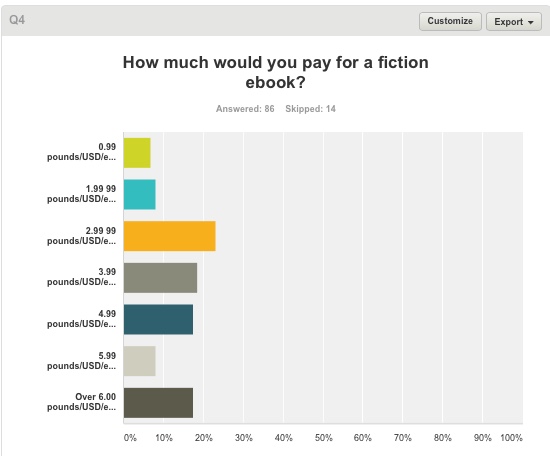
Book trailers are not watched it seems; a shame, as I love making them. Perhaps we should publicise them more? Some interesting comments here.
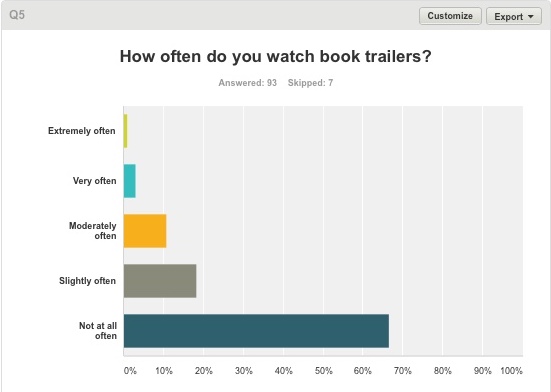
To blog or not to blog? In answer to Question 6, readers seem to visit author blog sites less often than writers might imagine (or wish!). And the comments seem to back up the statistics. Perhaps we writers should write more words in our books than our blogs?
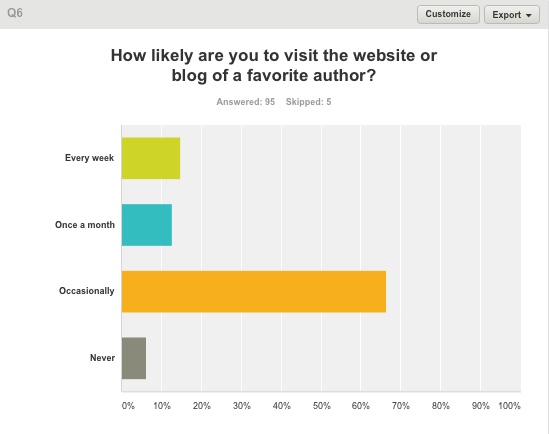
Question 7 about the Roma Nova newsletter was selfish, but it was nice to see that five people would like to subscribe. Sadly, I can’t identify them as all respondents are, of course, anonymous. But if you’re one of the five, here’s the sign up page. 😉

I was curious about what readers would like in a newsletter. The top three items in reply to Question 8 were: news about the author themselves, author’s current writing, author’s events and news about sales and awards. Pictures were not quite as popular as we think. The low score for Roman news/facts was probably due to the survey audience being wider than my own readers. Challenging comments for those of use who issue regular newsletters!
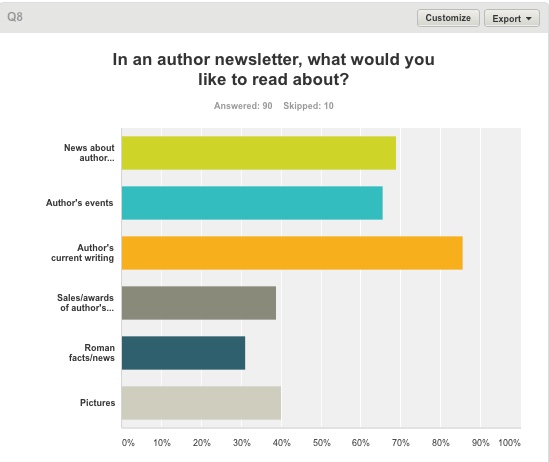
So where would readers leave a book review? I offered three of the ‘usual suspects’ – Amazon UK, Amazon US and Goodreads, plus ‘Other’ which was quite interesting… Authors know reviews are life-blood as they help a book’s journey in the competitive sea of publishing, but they acknowledge that reviews take a little time to write.
Readers who do squeeze out some of their precious time to write some words should be awarded medals and book bloggers made saints.
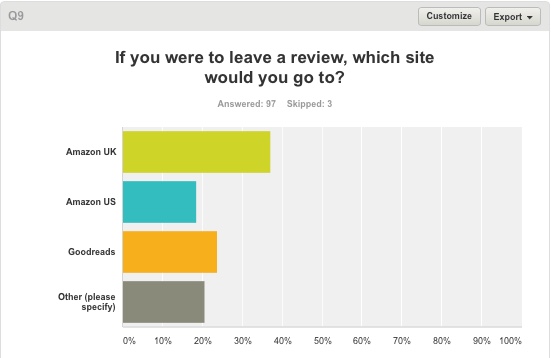
And lastly, for Question 10, “Would you follow an author on social media? If so which?” Facebook and Twitter won comprehensively, but “Their own blog” came a significant third. And again, the comments are worth reading!
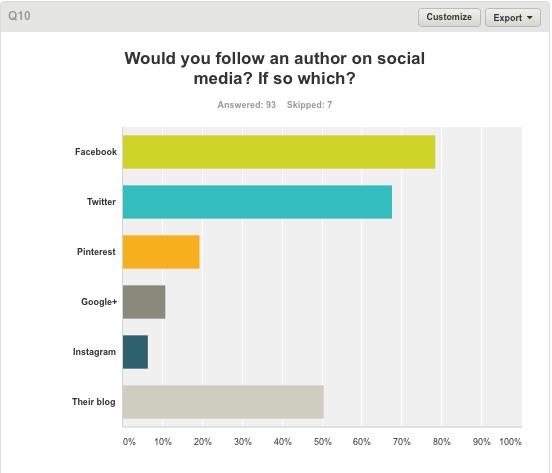
How I did it
I’m not a professional marketer, so I kept it really simple. The readers were self-selecting from a spread of Facebook reader groups in the US, France and the UK, my own newsletter readers and random readers from a Twitter campaign. I used a free version of Survey Monkey which allowed 10 questions and 100 replies. Questions attracted a 90-97% response by people taking part. All links have been deleted in this report and the supporting lists.
Alison Morton writes the Roma Nova thrillers, INCEPTIO, and PERFIDITAS. Third in series, SUCCESSIO, is now out.
Find out more about Roma Nova, its origins, stories and heroines…
If you enjoyed this post, do share it with your friends!Like this:Like Loading...
|
Subscribe to Blog via Email
Join 50 other subscribers.
Categories
Archive
|
 I belong to a local writers’ circle and yesterday it was my turn to lead the session. We have a lively discussion which resulted in more ideas. Here’s a potted version…
I belong to a local writers’ circle and yesterday it was my turn to lead the session. We have a lively discussion which resulted in more ideas. Here’s a potted version… 3. Be proud of what you have achieved
3. Be proud of what you have achieved 6. Take risks
6. Take risks

























